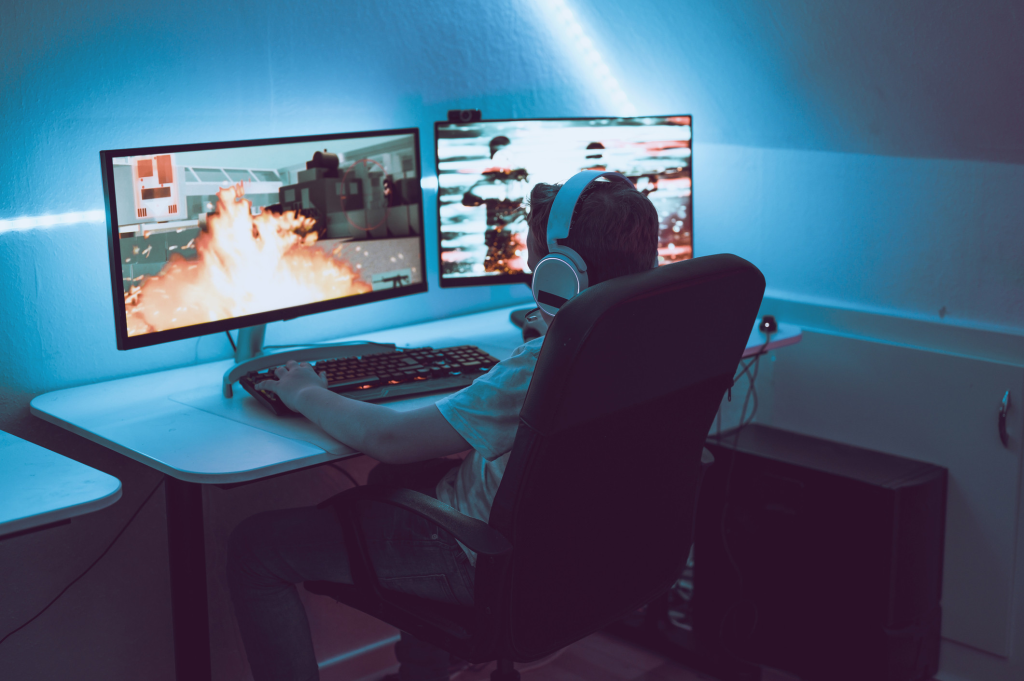Welcome to Gamer Be. We deal in all updated games and APK Mod. effects of gaming on young people and society.
About the Relevant Content
Video games are more popular today than at any time in their history. This pastime transcends national, racial, socioeconomic and gender boundaries. The gaming industry was born in the United States, but is known worldwide.
Concern about video game addiction is growing in the United States. According to statistics, 72% of US homes have video games installed. This equates to approximately 150 million players. Of these, 19,000 feel uncomfortable when they can’t play video games regularly.
Concerns about video game addiction have increased in recent years, but this is nothing new. In the 1980s, schools were prohibited from having arcades on campus. In the mid-1990s, rating systems were used to keep children above a certain age from accessing video games that were deemed inappropriate.
Many believe that regulating youth video game use is more important than ever to prevent addiction and minimize the potential for school violence. The latter concern stems from the belief held by many that video games are associated with increased aggression in children. Some argue that video games can be seen as “murder simulations” for children and adolescents, and that over time children can become desensitized to violent behavior.
Negative effects of gaming on student performance

Studies have shown that video games have a negative impact on the performance of some students. Video games are readily available. Studies show that some children become addicted by the age of six.
Parents and educators are understandably concerned. Video game addiction is believed to contribute to the mental health and social anxiety that even young children face today. There seems to be a link between depression, self-esteem, and time spent playing video games.
Studies show that 94 percent of video game addicts are men and only 6 percent are women. Many of the men interviewed were dissatisfied with their social life and had low self-esteem. It is understandable that both of these characteristics can affect a student’s academic performance.
The study was conducted in the United States with 3,034 participants. Nine percent of the young people surveyed showed symptoms of addiction. About 4% played video games at least 50 hours a week. On average, study participants played approximately 20 hours per week. Video game addicted students generally performed worse in school than non-addicted students.
It will be interesting to see how China responds to the negative impact video games can have on students. For example, China has passed a law that bans children from playing for more than 90 minutes a day, and only allows children to play video games before 10pm.
How video game addiction develops

Unfortunately, many video game-obsessed children report looking for someone to talk to and finding none. They see video games as a way to relieve the stress they feel in their lives by allowing them to escape through virtual reality.
Video game addiction in children does not occur entirely in isolation. The negative effects of video game addiction are obvious to the most observant. Parents and teachers alike may notice their child’s performance in school is declining due to poor grades and undersized classes.
Video game addicts often end up falling asleep during school because they play video games for hours. You may not be able to complete the assignment or turn it in on time. Video game addiction leads to loss of interest in extracurricular activities such as club events and sports. Video game addicts may also play video games in isolation from family and friends.
Health Risk
A study was conducted among 2,000 children between the ages of nine and eighteen who spent an average of seven hours and 38 minutes in front of the screen. Of these 2,000 children, 27 percent reported less than excellent mental health and 19 percent reported poor mental health. When you look at the average time these individuals spent playing video games, you see that they spent more time playing video games each week than adults did at their full-time job.
Thirty-nine percent of the children in the study suffered from anxiety, mental health problems and depression. A quarter of them have visited a therapist or medical clinic.
Positive effects of gaming on student performance
It is undeniable that the digital age has changed the way students learn. Like anything else, he has two sides to the debate about the impact of video games on student achievement. A recent survey of more than 12,000 Australian high school students. The study found that students who played online games almost every day performed 15% better than the average student in math and reading, and 17% better than the average student in science. turned out to be However, it is difficult to prove that video games are responsible for the improvement.
One of the reasons for these score improvements is the fact that playing online games requires solving puzzles to advance to the next level. To do so, students need to apply the science, reading and math skills they learn throughout the day.
One might argue that children naturally gifted with math, science, and reading are drawn to online video games. Talented and good students can finish their homework faster, so they have more time to play. This means that online games can help identify academically successful students.
A study conducted at Columbia University showed that children between the ages of 6 and 11 who frequently played video games had significantly improved intellectual and overall academic performance.
Can Gaming Heal?
One study showed that college students who played 50 hours of action video games over about 12 weeks had improved visual contrast sensitivity. These subjects were better able to discern small differences in shades of gray than controls.
Eye Health
Another study was done with lazy one-eyed people. The study instructed healthy eyes to be covered when playing video games. One control group was instructed to cover good eyes and engage in activities such as watching television or knitting.
At the end of the study, those who watched TV, knitted, or engaged in other activities using only their lazy eyes saw little improvement. However, study participants who played video games with only lazy eyes showed significant improvement. Many in the gaming group developed 20/20 visual acuity in their lazy eye. After playing a video game, you can now adjust the input from both eyes at the same time. This improved depth perception.
Dyslexia and Gaming

Dyslexia affects a student’s performance in school. In some cases, dyslexia is caused by visual attention problems. One study showed that playing video games for 12 hours improved reading comprehension tests in dyslexic children. The results were so impressive that a video game training program was developed to treat the effects of dyslexia.
Increased Mental Health
People who play video games have enhanced executive functions, the ability to quickly solve problems and make good decisions using mental resources such as attention, cognition, and memory. School gamers have improved their ability to multitask. Increased mental flexibility. All of these help students improve their performance in school.
Studies like this have made parents think about the limits of their children’s computer games. Many argue that studies pointing to the negative effects of video games are based on myths or exaggerated. Suggestions There is ample evidence that many of the intellectual skills children need to succeed in life as adults can be developed and enhanced by playing video games.
Last Word about it
Most experts agree that moderation is the key to success. Too much time spent playing video games robs students of the time they need to study, do their homework, and socialize with others. However, strictly banning students from playing video games can take away some of the benefits of video games. And it can take the fun out of game effects.










